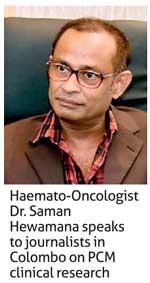Reply To:
Name - Reply Comment
A clinical research on plasma cell myeloma (PCM) carried out by a group of Sri Lankan doctors has been accepted and published by the prestigious American Society of Clinical Oncology journal.
 It is the first paper entailing an analysis of the local context to be listed in the international medical publication.
It is the first paper entailing an analysis of the local context to be listed in the international medical publication.
The paper titled ‘Response and Survival Estimates of Patients With Plasma Cell Myeloma in a Resource-Constrained Setting Using Protocols From High-Income Countries: A Single-Centre Experience From Sri Lanka’ was authored by a total of 15 researchers and led by Haemato-Oncologist Dr. Saman Hewamana and Cancer Specialist Prof. J. Balawardena.
The research is the only well-characterised study on long-term survival of patients with PCM in Sri Lanka. Myeloma is a common type of blood cancer. The incidence of myeloma has increased over time but the death rate has fallen because of development of new treatment modalities and protocols. However, the availability of agents and applicability of protocols in low and middle-income countries are debatable.
As there is a significant disparity in global cancer care and outcome between countries, the clinical research aimed to track and compare progress in the treatment of symptomatic PCM in high and low-income countries. The aim of the study was to provide data on clinicopathologic characteristics, response and survival estimates. The research was a retrospective cohort study of all patients diagnosed with PCM between May 01, 2013 and September 30, 2021, at the first hemato-oncology centre in Sri Lanka. A total of 79 patients with PCM received first-line therapy during the study period. The median age was 64 years and approximately 33 percent of patients were older than 70 years. There were 42 males and 37 females.
The study found that the overall response rate was approximately 97 percent for both cyclophosphamide, thalidomide and dexamethasone and bortezomib, thalidomide and dexamethasone. Twenty-three of these patients died during the study period but only 14 died due to PCM or associated sepsis.
The study concluded that it is possible to successfully apply Western treatment and supportive care protocols to the local population.
Speaking at an event discussing the findings of the paper, Dr. Hewamana expressed confidence in the published data helping Sri Lanka’s healthcare sector to benchmark and improve the treatment and develop blood cancer care in the local setting.